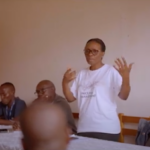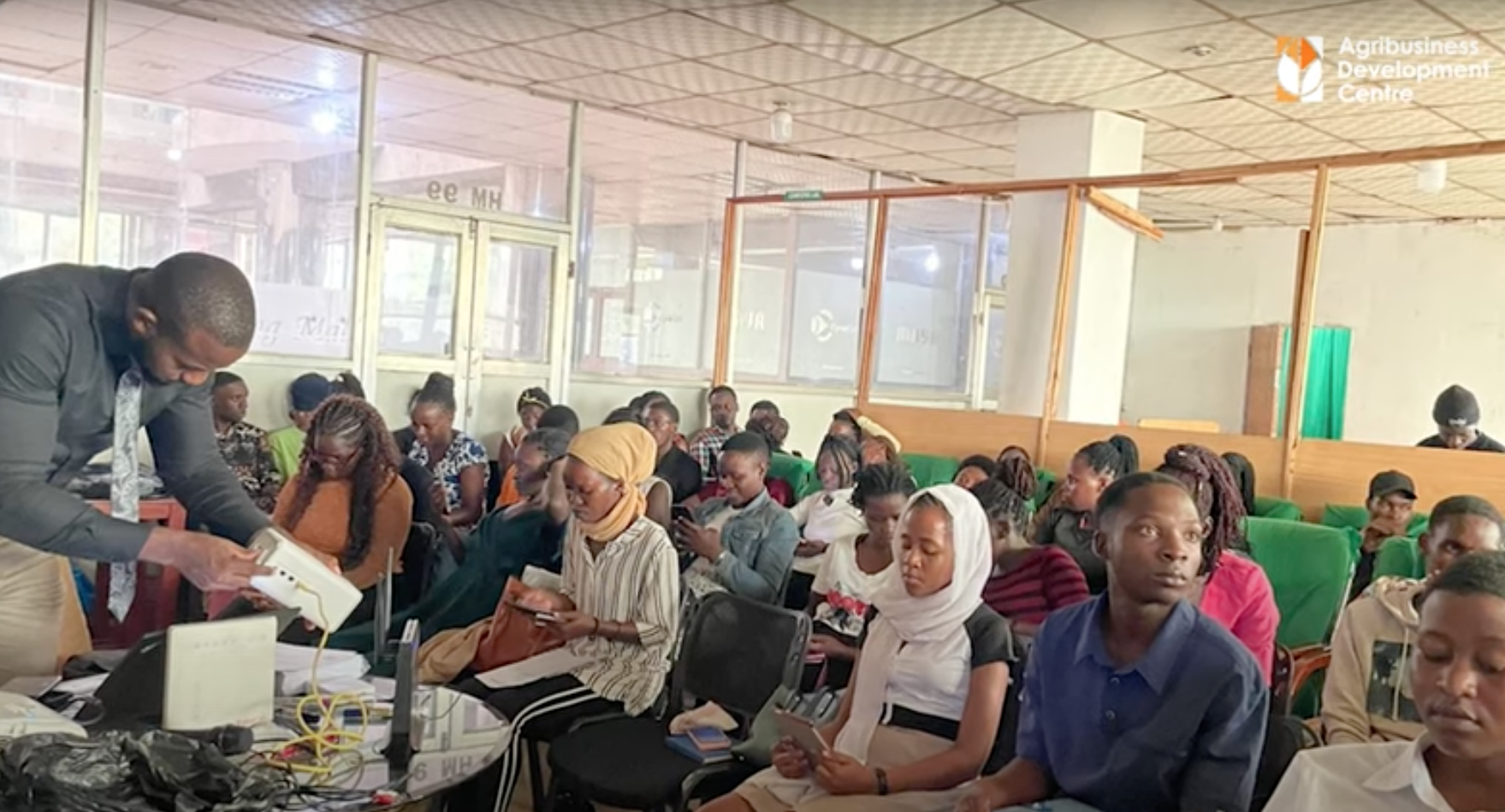
HI INNOVATOR IMPACT STORY
Shaping the Future of Uganda’s Young Entrepreneurs! Towards the end of last year and earlier this year, we embarked on an exciting activation to introduce the HiInnovator Program to students in various institutions across the country. This initiative, led by NSSF and the MasterCard Foundation, and implemented by *Outbox, has provided students with invaluable opportunities to choose between the Business Foundation Course and the Career Planning Course – both designed to equip them with practical skills for their entrepreneurial and professional journeys. Students who enrolled in the Business Foundation Course gained vital knowledge in business management, learned how to prepare profit and loss statements, set both short- and long-term goals, and discovered the importance of branding, promotion, and sales strategies for business growth. Meanwhile, those who took the Career Planning Course benefited from enhanced career guidance, understanding how to align their passions with career goals, personal branding, and job market navigation. This course has been crucial in helping students strategically plan for their futures, whether as entrepreneurs or professionals. The HiInnovator Academy offers even more courses like E – Business essentials, Business Compliance among others to support young innovators in building successful ventures and thriving careers. A huge thank you to Outbox for expertly implementing the program, and to NSSF and the MasterCard Foundation for creating such a transformative initiative. The impact on Uganda’s youth has been profound, providing them with the skills and confidence to forge ahead in their entrepreneurial and career pursuits. Together, we are building the next generation of business and industry leaders!
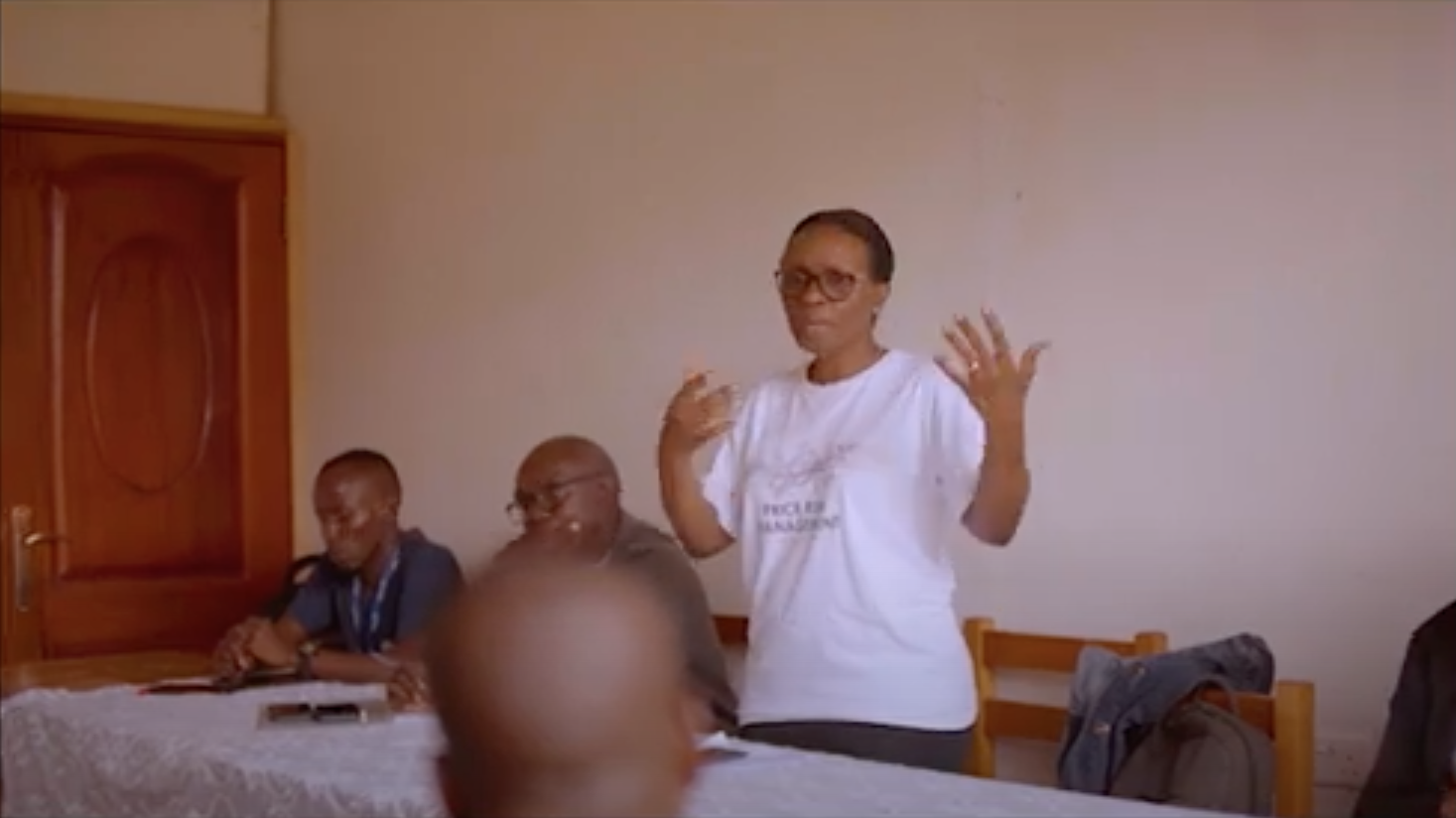
A monitoring visit to Buikwe
Dive into the inspiring journey of the Reach Out Cooperative and SAO SACCO as we showcase the transformative impact of ADC’s interventions in Buikwe District. From training programs to financial literacy initiatives supported by partners like dfcu Bank and JICA, witness how these cooperatives and SACCOs are driving financial empowerment, fostering sustainability, and unlocking opportunities for growth. Join us in exploring the stories of resilience, hope, and success as ADC continues to shape lives and communities across Uganda. Don’t forget to like, share, and subscribe to stay updated on our latest impact stories!
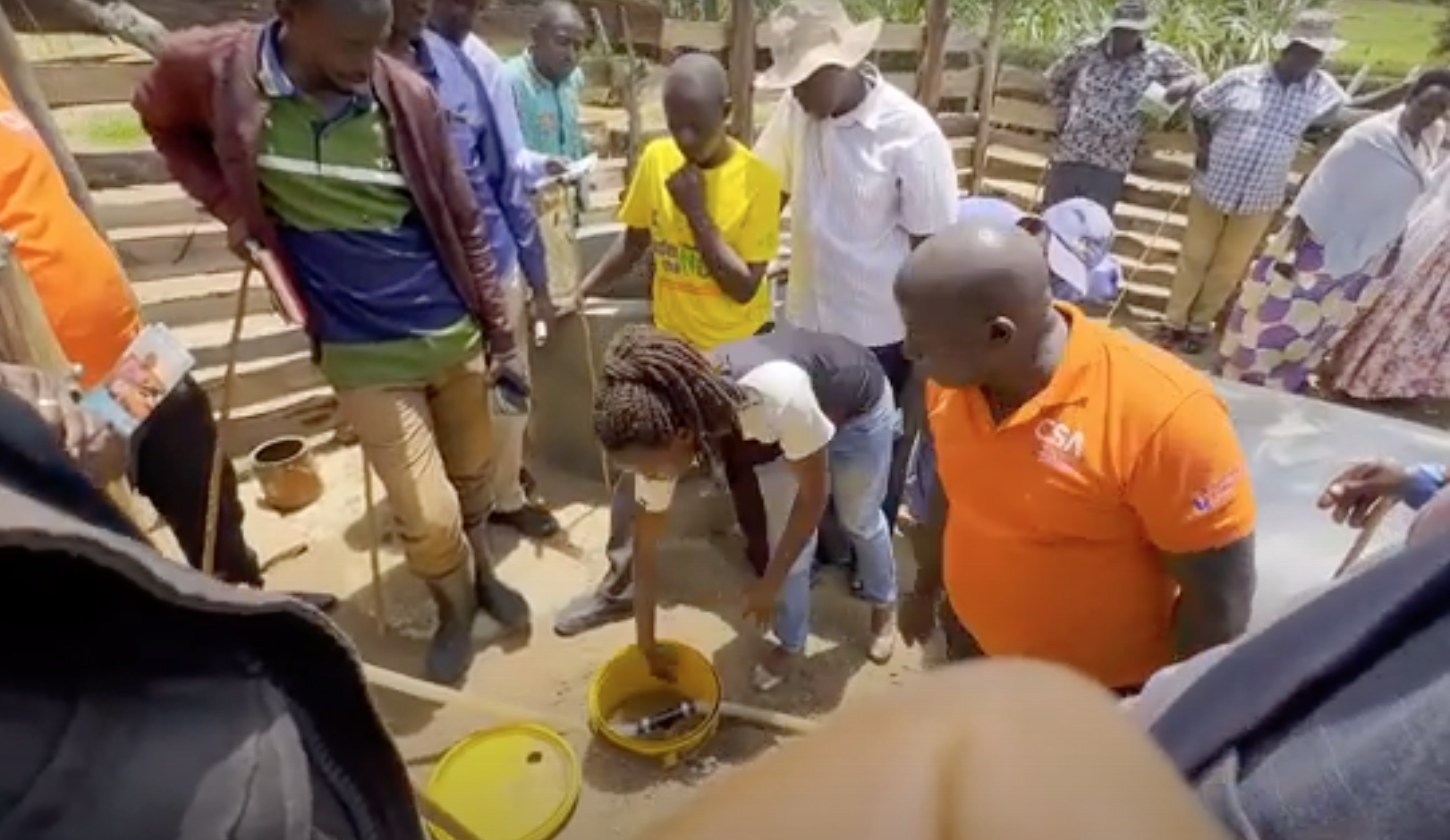
A monitoring visit to West C where the climate-smart Agriculture program is being implemented.
A tour through the regions that have implemented the Climate Smart Agriculture project funded by the Abi Development in a bid to train more farmers to be more resilient to climate change and its effects.

ADC ED Recognised in the CEO East Africa Magazine 2024
We are proud to announce that our Executive Director, Josephine Mukumbya, has been recognized in the CEO East Africa Magazine as one of Uganda’s 100 Leading and Most Admired CEOs 2024
Her visionary leadership at the Agribusiness Development Centre (ADC) continues to inspire and drive impactful change in the agribusiness sector. This recognition is a testament to her dedication, passion, and relentless commitment to empowering communities and fostering sustainable development.
Read more about the recognition in CEO East Africa Magazine here: https://www.ceo.co.ug/ugandas-100-leading-and-most-admired-ceos-2024/
Join us in congratulating Josephine on this remarkable achievement!
#Leadership #Recognition #AgribusinessExcellence #Inspiration #UgandasTop100CEOs #JosephineNakoma #ADC

TOAST-TO-THE-YEAR 2023 Party
An incredible time that combined team-building activities, gifting, awards, farewells and an abundance of joy!
At our Head Office, Nakasero, on December 15th, 2023, we hosted a remarkable toast-to-the-year party graced among others, ADC Friends including William Sekabembe, the former ED at DFCU, George Ochom, MD of dfcu Limited, Paul Van Alperdoorn, Chairperson of the Board of Directors, James Semwanga, Director. It was an incredible time that combined team-building activities, gifting, awards, farewells and an abundance of joy as the team warmly concluded 2023.

On this same special day, ADC bid farewell to former DFCU Executive Director, William Sekabembe. In his farewell speech, he entrusted ADC with the task of revolutionizing the agricultural industry and also commended the team’s hard work.

Follow the link to view more Party pictures
POEM OF THE DAY
Jingle Bells at home, Cheers to the special day filled with cocktails of hard work, gifts and laughter.
Dancing to a successful 2023 was Aaron, Ronald, Roland, Katia, Sharon, Catherine, Lynnette, Jannet, Wilber, Simon, Silver, Sharon, Daniel, George, Francis and Stephen.
William Ssekabembe, a visitor, yet family in our journey, ‘Farewell thee’ we bid him.
George William Ochom a fun and humorous visitor engineered more wine sipping as the dancing continue! To the tunes of Faith.
Our Director’s speech, a powerful call to action to claim ADC’s rightful place in the Agribusiness Space.
James Semwanga, words full of motivation and encouragement of grace.
Happiest of the day was Paul Van Alperdoorn, Chairperson of the Board of Directors, smiled from a mile yet so close.
The Jingle bells did make the best noise as Catherine and Simon elevated the day with raps and a memory dance.
Thank you, Josephine Mukumbya! you lead to promote sustainable agribusiness in Uganda. We commit to realizing the benefits of your leadership.
By Andrew Ataho

Ronald K. Ssekaja Talks Innovation
Ronald K. Ssekajja, ADC’s Project Manager for Innovations spoke to AgriDigest to discuss Innovation in Agribusiness. Ssekajja who is a trained technologist is passionate about promoting group business and Agritech innovation. This is an edited transcript of the interview, which covered everything innovation in agribusiness.
Why Agribusiness? How did you end up here?
I ended up here because there is a high demand for innovation within the agricultural value chain to increase productivity. It is important to share the knowledge acquired from the tech and innovation space with different practices and businesses within agriculture. This will ultimately result in increased productivity and profitability for those involved in this particular field.
What are the challenges in Agribusiness as far as innovation is concerned?
The main challenge that we face is adaptability, along with a lack of belief. A large number of people do not believe that things can be done, so changing their mindset is the biggest challenge. Of course, there are also challenges in terms of access to finance, which is why organizations like ours are stepping in to provide these technologies and innovations at a subsidized rate, and sometimes even for free. This way, people can utilize and adopt these technologies, and later on, commercialize them.
We are trying to bridge the gap and ensure that people initially believe in these platforms and technologies. We are also supporting people to access finance by using these different technologies and helping them to adopt them in their production, such as agriculture production, as well as in their business ventures, for those who are involved in agriculture at different levels in the various value chains.
How is the innovation spectrum looking, from your eyes of your organisation (ADC) as a leader in Agribusiness?
I think the prospects for agriculture are very promising, but there is a significant amount of slow growth due to differing opinions between people and the government’s view of agriculture. However, it’s worth noting that many young people and smallholder farmers are scaling up and growing in this field. Although there are several challenges, the industry is growing steadily.
What notable innovations has ADC introduced to stimulate Agribusiness?
ADC has introduced many innovative solutions, particularly in the field of learning. We have also launched several initiatives to enhance implementation. To improve learning, e-learning and virtual learning channels. The e-learning platform, SOMA, offers over 10 courses covering topics such as agronomy, financial literacy, and farming as a business. The virtual channels, on the other hand, are more like podcasts and can be accessed by those without internet connectivity. These channels enable young people and farmers to learn new skills and improve their knowledge, which in turn enhances their work practices.
Moreover, ADC has expanded its services to help people access markets and finance, which are significant challenges in the agricultural value chain. One such service is the DFCU Katale, a marketplace that connects users with various input providers. ADC also guides how to handle price risk and contracting aspects for those involved in export and trade. With ADC’s comprehensive catalogue of services, people can access a range of resources to improve their agricultural practices and business operations.
Any words of inspiration to youth aspiring to be successful Agri-prenuers?
As young individuals, it is important to keep an open mind and seek access to available support. We should engage in government and development partner programs, such as Mastercard, that aim to facilitate our involvement in agricultural value chains and other businesses. Through working together, unionizing, forming cooperatives, and embracing innovations and technologies, we can become more productive and profitable in the field of agriculture.
Interviewed by Andrew Ataho (AgriDigest)

Cultivating Success Through ADC’s Business Accelerator Program (BAP)
AFRICA HAVEN – Transformation of an African exporter
Africa Haven, a prominent player in the global trade of tropical and exotic fruits and vegetables sourced from African producers, has seen exponential growth in its exports thanks to the transformative impact of the Business Accelerator Program (BAP).
Access to affordable credit remains one of the most pressing issues for agribusinesses in Uganda. A lack of collateral and the burden of high interest rates create formidable barriers for entrepreneurs seeking to invest in their farming operations or expand their businesses.
Limited access to markets, both domestically and internationally, is another significant hurdle. Many agribusinesses, struggle to reach consumers due to a lack of market information and infrastructure.
The adoption of modern farming techniques and technologies has been slower than desired. Many agribusinesses, especially those in rural areas, lack access to vital tools and knowledge that could significantly boost productivity and competitiveness.
The state of rural infrastructure in Uganda, including roads, electricity, and storage facilities, poses a considerable challenge. Poor infrastructure increases transportation costs and hampers efforts to efficiently process and store agricultural products.
Climate change and its unpredictable impacts, such as prolonged droughts and devastating floods, pose a constant threat to agricultural productivity. Smallholders, in particular, bear the brunt of these weather-related challenges.
Inadequate post-harvest handling and storage facilities contribute to significant losses of agricultural produce. This not only diminishes profits but also affects food security by reducing the availability of crops for local consumption.
KIKAZI’S MILLET FLOUR – A flourishing enterprise courtesy of BAP
Start-ups have been impacted in a significant measure too. Grace Kikazi, a specialist in producing high-quality millet flour, has emerged as a success story, all thanks to the Business Accelerator Program (BAP).
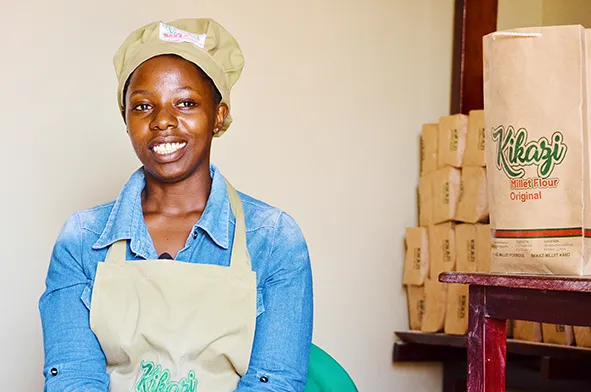
Founded in 2019, Kikazi’s journey from a small-scale cottage industry to a flourishing enterprise is a testament to the power of knowledge and training. Under the guidance of BAP, Kikazi successfully registered her business, obtained a trademark and a UNBS quality mark, and registered with Uganda Revenue Authority (URA). Kikazi, the founder of Kikazi Millet Flour Original, was inspired by a mother in Fort Portal who needed quality millet flour for a diabetic patient. Hailing from the millet-rich region of Bushenyi-Rukungiri, Kikazi saw the potential and gradually began her millet flour venture on a small scale. In 2020, she decided to take it more seriously, but the Covid-19 pandemic posed initial challenges. With a modest initial investment of Shs3m from her savings, Kikazi ordered millet grain from farmers in western Uganda. She sorted and cleaned the grain before packaging it. In the beginning, production was limited to a few bags, each weighing around 100kg. Kikazi outsourced the grinding machine and carried out packaging at her home in Kireka, operating as a cottage industry.
In April of this year, Kikazi received guidance from an expert associated with ECOS, a project aimed at enhancing the competitiveness of Ugandan SMEs. The expert emphasised the need for a solid structure to scale up her business. It was during this time that Grace was introduced to ADC and embarked on a journey of learning. Through the Business Accelerator Program, Kikazi gained crucial insights into corporate governance, organisation, and formal business registration. There are quite a number of things I thought I should implement though I haven’t implemented some. What I did for example, I shifted from home. I learnt that proper record keeping is really important. I also learnt that I don’t need to do everything on my own. Previously Kikazi was registered as a just a business name, I learnt that if you keep in that area you stay small and can’t scale up, you can’t be a supplier and you can’t be profiled in a government database,” she says of BAP’s impact.
BAP also highlighted the significance of digital marketing in today’s era, leading her to establish an online presence for Kikazi. Kikazi aspires to acquire a high-quality milling machine and secure financing for marketing efforts. She is also focused on establishing robust corporate governance structures and efficient sales management systems for Kikazi.
“With the linkages the programme exposed me to, I am sure of securing financing to have all this done and be able to tap into the export market,” she says. Kikazi emphasises the relevance and practicality of the training received through BAP. She advises fellow entrepreneurs to attend such programs whenever possible. “The trainings were physical and when you have those interactions, you get to understand the concepts much better,” she says.
RAW&ORGANIC – BAP gives wings to shea butter business
Raw & Organic, a company specialising in the extraction of pure Shea butter, has seen remarkable transformation, because of the Business Accelerator Program (BAP). Enid Natukunda Mugisha, began her journey in 2019 and has since not only built a thriving business that has also made a meaningful impact on her own life.
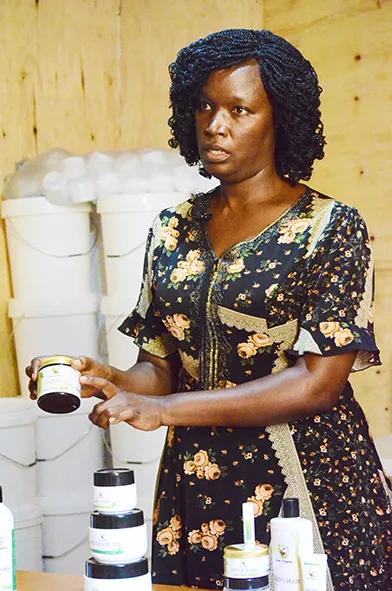
Natukunda’s entrepreneurial journey was born out of personal struggle. Her own battle with alopecia, a hair-loss condition, led her to seek natural remedies like Shea Butter. After losing her hair, particularly during the COVID-19 lockdown when she couldn’t visit her hairdresser, she decided to add value to Shea Butter. Shea Butter Nilotica, made from the nuts of the Nilotica Shea tree, is renowned for its natural properties and benefits for hair and skin. Raw & Organic sources Shea nuts from northern Uganda, and through the cold-press extraction method, they produce pure Shea butter. The company is UNBS certified, ensuring the authenticity and quality of their products. While Shea Butter was the initial focus, Natukunda expanded her product range to include skincare and hair products. The demand for these products grew as customers experienced the benefits. The company now produces shampoos, hair conditioners, treatment products, and hair food, among others.
The sustainability of Shea nut trees is a concern due to the impact of charcoal businessmen. These trees take around 35 years to yield nuts, making their protection vital. Additionally, Natukunda faces challenges in securing a permanent location for her business and expanding into export markets to boost demand.
“I am not sure when I will be moving to another place. Our new place was dilapidated but luckily there is efficient power supply. We put in a lot of money to clean it and we even got into debt,” she says. Our hope is to get land and have a structure of our own. Natukunda discovered BAP through DFCU Bank’s ‘Women in Business’ forum and decided to enroll.
“Someone in another business group told me about BAP as a hot cake. She had got to know about it through ECOS, which is funded by GIZ. That is why I didn’t hesitate to enroll for BAP,” she says. The program provided invaluable knowledge and practical insights. It emphasised corporate governance, encouraging the formation of advisory boards. Financial literacy and management practices improved, helping Natukunda create a comprehensive business plan.
“We now know how to do a business plan. I had a shoddy business plan but they helped us to develop the new one we are using. We now even have a marketing plan with them step by step. That has improved a lot in our work. All along I was doing this by myself. Even the money was coming through my account but now I am getting out slowly by slowly. The funders and bankers look at the company not an individual,” she said.
Raw & Organic is actively working on marketing and sales strategies to expand its reach. Natukunda is considering stocking more products this year to meet increasing demand. She emphasises the need for patient capital to fund business growth and is looking for grants to achieve this.
“There’s nothing you can do without money. If I do marketing the right way, demand will increase. I will need more products. This calls for more capital investment in the value chain,” she says.
For someone who has not attended BAP training, Natukunda says they should do.
“Even if you don’t need the capital, they help you put your house in order. Through the training, we are now on the journey of product certification with UNBS. You may have happy customers,but you need to certify your products with quality marks,” she says.
JAKI AGRIBUSINESS – A side hustle that blossomed
Janet Kibwika, a 66 year old poultry farmer, has witnessed a remarkable transformation in her agribusiness journey, and at the heart of this transformation lies the invaluable support she received from the BAP training.

From humble beginnings as a poultry farmer supplementing her income, Kibwika’s story exemplifies the power of knowledge, training, and the right support system in propelling an agribusiness to success.
Kibwika embarked on her poultry farming journey in 1994 while working as a transporter at Kyagalanyi Coffee Company. What started as a side hustle with 250 birds in her garage soon became a thriving venture. During the early days, the poultry market was favourable, and Kibwika was making substantial profits which reinforced her commitment to the business.
Kibwika’s determination led her to save enough money to purchase her first piece of land within just three rounds of poultry sales. She continued to expand, eventually acquiring two acres of land in Wakiso District in 2009. Kibwika’s love for chicken rearing became her daily routine, and she was managing a stock of 1,000 chickens monthly before the Covid-19 pandemic hit. The pandemic presented unforeseen challenges as lockdowns disrupted her sales. With 650 birds ready for sale during the first lockdown, Kibwika struggled to find buyers. Her profits dwindled, and she found herself exploring alternative businesses. At this point, Kibwika realised the importance of formalizing her business.
Kibwika’s journey took a significant turn when she attended a farmer’s meeting in Nansana, where she met a veterinarian officer who referred her to a business training session at Ivory Hotel. This is where she met Mr. Jimmy Byaruhanga, a trainer with the ECOS program. ECOS focuses on equipping small and medium-sised enterprises (SMEs) with the skills needed for growth.
Kibwika’s interaction with ECOS trainers emphasised the importance of business registration, financial management, and other essential aspects of running a successful enterprise. She realised that without formalising her business, she was limiting her potential. With guidance from ECOS, Kibwika registered her business as Jaki Agribusinesses Limited, a name derived from her own, Janet Kibwika. She obtained a Tax Identification Number (TIN), setting her on the path to compliance. The training extended over four months and covered various critical topics, including financial management and price risk management. Kibwika attended every session diligently and opened a bank account for her business. She learned the significance of record-keeping, which she now takes seriously. Separating personal and business finances became a priority, leading to improved financial discipline.
“Now I write down everything and I have learnt to separate my own money for domestic expenses from the business. Now I realise, it is not my own now but for us. You see with us farmers, documenting is a very big problem. For instance, when you buy chicken feeds, you postpone it to another day because you are tired. When it continues like that, you forget,” she says.
Kibwika’s participation in the training introduced her to a network of fellow farmers and entrepreneurs. Interacting with people from diverse backgrounds and businesses allowed her to share experiences and expand her knowledge base. As a poultry farmer, she recognised the potential for growth but also the need for financial support.
Kibwika’s journey has opened her eyes to possibilities she hadn’t explored before. Her immediate goal is to restore her business to pre-pandemic levels, which requires financial assistance. Currently, she manages 250 birds and envisions expanding her chicken house into a double-story structure for year-round production. She learnt how to diversify her business by venturing into related businesses.
“I have to be on the market regularly. But even beyond, I have been taught about the value chain. You can do businesses which are in the same line. I have the plan of keeping the layers also. I also have a plan of starting a bakery because I have every done it. I can also open up a shop selling the feeds because I have all the knowledge,” Kibwika says.
Kibwika expresses her gratitude to the BAP program and its facilitators, who demonstrated a genuine concern for the success of businesses like hers. She acknowledges the transformative power of knowledge and emphasises the importance of record-keeping and financial management for farmers and entrepreneurs alike.
Kibwika and her fellow program participants graduated in June and were featured on the Uganda Investment Authority (UIA) portal, a significant pathway to business development.

Top 4 Agriculture Based eLearning Platforms in Uganda
Agriculture is one of the sectors that have witnessed significant growth in creativity, with innovators coming up with modern ways to handle farm mechanization, assess weather patterns, manage pests and diseases, and improve access to farm inputs, finance, markets and digital agricultural services.
These innovations elevate Africa through shared information among farmers, transforming their ventures from subsistence to thriving commercial businesses.
The new innovations in agriculture have shown us how technology can help us build more sustainable food systems and improve the food system. Amon the innovations includes Farm automation (tractors & drones, Robots, and eLearning platform such as
- SOMA – www.soma.adc.ug
- Atingi – www.atingi.org
- OLC (Open Learning Campus) – olc.worldbank.org
- AYA (African Youth Agripreneure) – www.ayaplatform.org
These platforms transform the lives of smallholder farmers and traders in Uganda and beyond, though their uptake could be faster, especially in rural farming communities.
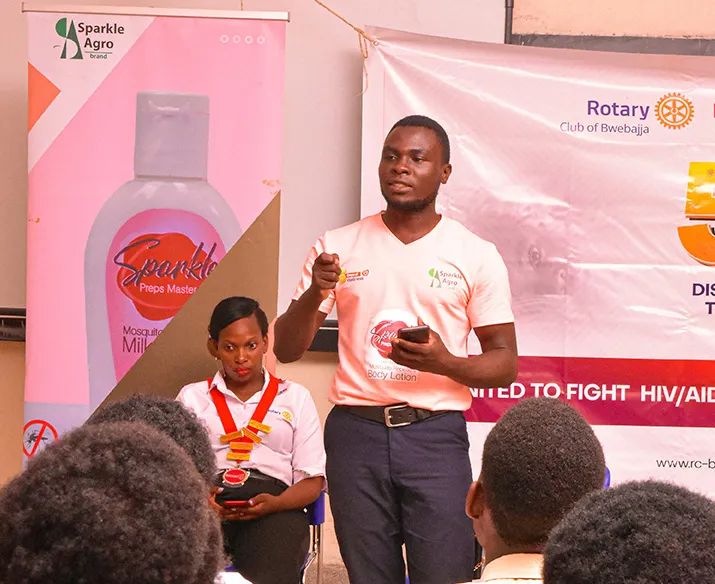
Repurposing Waste Milk Into Mosquito Repellent
Tell us about yourself
Brasio Kawere Kigongo, a co-founder and Operations manager at Sparkle Agro-brands limited. We repurpose inedible waste milk Into Natural Mosquito Repellent lotions. I founded Sparkle in 2019 while still a student at Makerere University. I drew inspiration from personal tragedy and a deep commitment to empower smallholder farmers in Uganda. Born into a family of ten, my journey began amidst the challenges of mixed small-scale farming in the then rural Kitende, Uganda.
Where do you pick inspiration for creating the natural mosquito repellent?
Early in my life, my eldest sister, Dorah, succumbed to malaria-induced anemia at the age of 12. This loss ignited a lifelong mission, and I dreamed of finding solutions to alleviate the financial struggles of my family and countless farmers.
My pursuit of change led me to Makerere University for A Bachelor’s of Science in Agriculture, where I delved into the intricacies of agriculture. Here, I uncovered the harsh reality faced by small dairy farmers, which sparked the birth of Sparkle Agro-Brands Ltd. We repurpose surplus milk into Natural mosquito repellent, empowering farmers and protecting children from malaria.
Our products obtained the prestigious UNBS standard certification in 2023. We have served our solution to over 10,000 students attending schools within wakiso District and have repurposed 1250liters of inedible milk sofar from 30 farmers and 3 small fresh milk dairies.
We also educate small dairy farmers on optimal livestock nutrition and milk handling practices. We work diligently to boost milk volumes and improve milk handling methods, offering a path to increased income.
On 6th of June 2023, I participated in the Environmental, Social, and Governance (ESG) training organized by the Agribusiness Development Center (ADC). The training proved to be a profound learning experience for both my team and me. It provided us with invaluable insights into impact reporting aligned with rigorous ESG standards. Additionally, the program facilitated connections that not only expanded our access to cost-effective ingredient sourcing channels but also integrated us into the thriving ADC accelerator agribusiness community.
What are the future plans?
With a keen eye for better enterprise governance, we envision expanding sales to 500,000 students in 2024-2025. We are developing an application that not only streamlines milk collection but also provides dairy farmers with a platform to find markets for their fresh milk. Additionally, we plan to acquire a lactic acid extractor. This strategic move will enhance our ability to extract lactic acid from milk, opening up new opportunities for value addition and diversification of their product range.
We seek to build strategic partnership with agencies such as Heifer International, SNV, GIZ, ABi, USAID to amplify our efforts through, connecting us to their communities of smallholder dairy farmers who need our services as well as to their enterprise acceleration packages of visibility and investment.
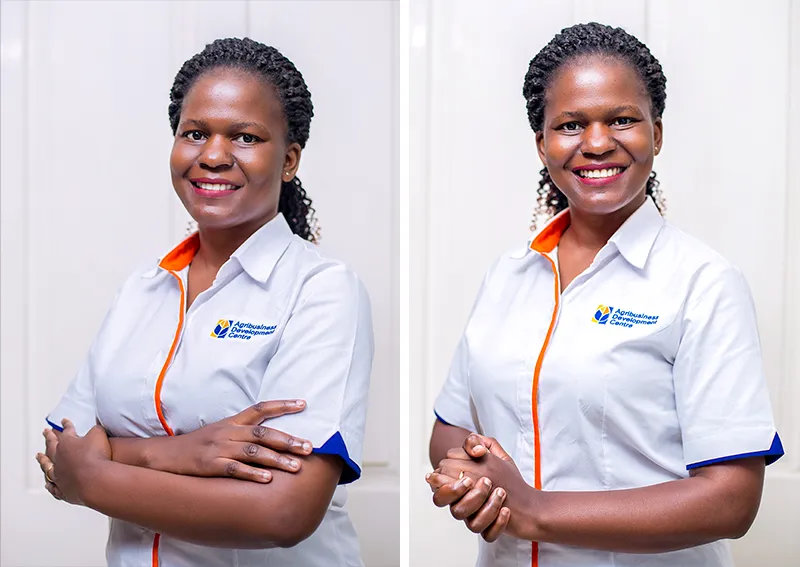
Have You Met – Juliet Amono?
Hey Juliet, what are your full names and responsibility at ADC?
Juliet Winifred Amono-Monitoring, Evaluation and Learning officer.
What makes you fit for such a very tough job description?
I hold a Bachelor of Science in Quantitative Economics from MUK (Makerere University) and a Post Graduate Diploma in Monitoring & Evaluation from UMI (Uganda Management Institute).
With extensive knowledge of data collection and analysis techniques, am able to identify the potential impacts and outcomes of different strategies. I can recommend relevant training and learning opportunities to improve the process, communicate effectively and deliver reports to the senior management at various stages. I also possess professional knowledge of using statistical packages like STATA, SPSS, Epi-info, Epi-data, Excel and MS Office applications. Working well in a team, receiving and sharing information are some of the things i bring to ADC.
What inspires you to do what you do at ADC?
The impact ADC creates in the communities through the Farmer-based organizations we work with has been a great motivation for me. Whenever I go for field visits to some of the FBOS we work, there is a smile on my face because I find out that there are many improvements in production, savings, access to finance, and marketing skills. These usually energize me to wake up and impact lives.
What life’s inspiration motto?
“Opportunities don’t happen, we create them”



